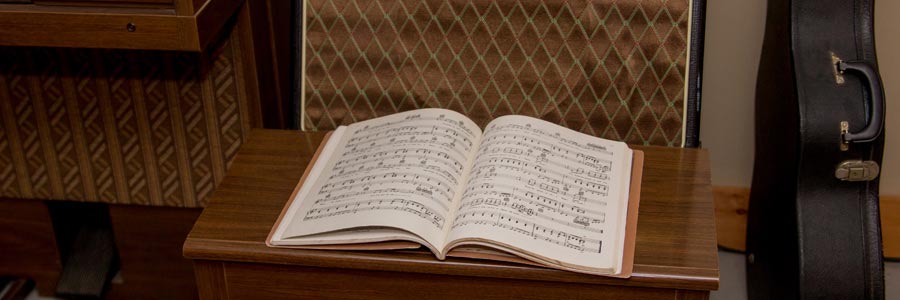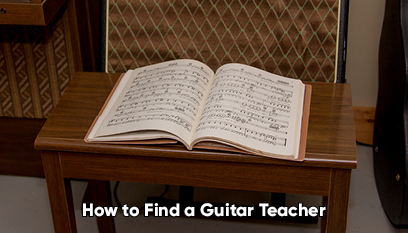 When you’re learning an instrument, a bad teacher can slow down your progress, or even frustrate you to the point that you give up entirely. That’s such a shame! So how do you find a really great guitar teacher?
When you’re learning an instrument, a bad teacher can slow down your progress, or even frustrate you to the point that you give up entirely. That’s such a shame! So how do you find a really great guitar teacher?
The qualities of a great guitar teacher vary from person to person, but there are some basics to look for.
- They should have extensive experience teaching people of your age and skill level.
- They should approach the lessons in an organized and professional way.
- They should be friendly and patient, and you should like being in their presence.
- They should show a genuine interest in the guitar and your long-term progress.
- Their lessons should be available at a time and a price that works for you, so you will stick with them.
This post assumes you are looking for a guitar teacher for yourself. If you are looking for a teacher for your child, the same advice applies: Look for someone who is a professional, has a good rapport with your child, and can keep your child excited about learning the guitar and music in general. As cheesy as it sounds, that is a gift that can last a lifetime.
Where to Find Prospective Guitar Teachers
You can Google guitar teachers in your area, but it may be hard to judge their quality. I recommend checking with a good local music store to get some referrals. They might offer lessons right in the store, but if they don’t, the employees are bound to know some great local guitar teachers. You can also ask any professional musicians in your network, or check out the music departments of any nearby colleges or universities.
Now that you have identified a few potential teachers, what factors should you use to evaluate them? The teacher’s background may be the most obvious thing you should consider, so let’s start with that.
Teacher’s Background
Education
Pretty much anybody can put out their shingle as a private music teacher — there’s no certification process. Ideally you’d look for someone with a bachelor’s degree in music or music education. A degree from a prestigious music school like Berklee or Peabody is probably overkill, especially for beginners.
But there are plenty of wonderful guitar teachers who didn’t major in music or didn’t go to college at all, so don’t let that be a dealbreaker. Just avoid completely self-taught guitar teachers, as they cannot pass along training that they never got themselves.
Teaching Experience
No offense to new teachers, but you probably don’t want to be among a guitar teacher’s first batch of students ever. Look for teachers who have been doing this for several years and have taught many students around your age and skill level.
It’s totally fine if teachers have students in multiple age groups, but they should be able to switch gears smoothly. It’s easy for someone who spends 90% of their time talking to 8-year-olds to come across as patronizing to an adult.
It’s never a bad idea to ask for references from current students. If your prospective teacher has been teaching for 10 years but can’t give you the name of a student they’ve had for more than one year, that’s a red flag.
Skill as a Guitarist
Obviously, your guitar teacher should know how to play the guitar! But being able to shred like a madman doesn’t make someone a great teacher. If you’re a beginner, you want a great teacher who is also a competent guitar player. They’re going to be teaching you foundational stuff like scales for a while anyway, so you need someone who will make it fun.
Your teacher also needs to be able to break down complicated ideas into smaller chunks, and explain things in a different way if you’re not getting it. Truly gifted musicians often make poor teachers, because they don’t know how to explain what they know. (The same phenomenon can happen when brilliant scientists become college professors.)
Some guitar students really want to learn from someone who is currently active in the music scene and playing shows. Others focus heavily on the teacher’s knowledge of, and interest in, the kind of music they want to play. Your goals as a guitarist will likely determine how much weight you give these factors. If you are considering taking lessons from a gigging musician, an important topic to discuss with them in advance is whether or not their gig schedule will impact their lesson schedule. For the most part you’ll find that serious gigging musicians plan their tours around their lesson commitments.
Teacher’s Approach and Personality
General Professionalism
You want a teacher who takes their job seriously. Their interactions with you should indicate a general level of professionalism. For example, they should be easy to reach via text, email, or an actual phone call. They respect boundaries and don’t try to become your new drinking buddy. They should prepare a plan for every lesson, and they should remember (or write down) what you worked on. It should be clear that they have a strategy for getting you from A to B. The skills you need to learn build on one another, so a random, make-it-up-as-you-go style of teaching will not help you develop those skills in a coherent way.
Judging professionalism is a good way to weed out people who are teaching lessons to pay the bills while they are working toward their real career. There’s nothing wrong with moonlighting — hey, I’ve done it and continue to do it! — but make sure guitar is their passion. You don’t want a teacher who is phoning it in until something better comes along.
Someone who is teaching as a very casual side gig will not have put much thought into preparing lessons or customizing instruction for each student. They will spend too many minutes of the lesson figuring out what to teach you. They might try to compensate by throwing piles of new material at you every week, before you have had a chance to master the old material.
Steer clear of teachers who can’t resist showing off to their students. Usually these players are not as good as they pretend they are, and “demonstrating” solos during lessons or talking nonstop about their awesome band is an ego boost for them. Save your money and find someone who actually cares about their students.
Teaching Approach
If you ask, the teacher should be able to articulate their teaching approach and philosophy. Find out how deeply the lessons will go into music theory. Are you going to learn to read sheet music, for example? What do they consider to be the foundational concepts every guitarist needs to master? Do they have a rigid program they expect you to follow, or do they adjust their teaching based on the needs of each student?
To get a feel for this, pay attention to what they ask you as a prospective student. A good teacher will ask you what your short- and long-term goals are, what you listen to, what songs you would love to be able to play, etc., and they will take your answers seriously. A lower quality teacher will just give you the same one-size-fits-all spiel they give everybody.
Personality and Enthusiasm
This is hopefully going to be a long-term relationship, so you should actually like being in their company! They should be friendly and patient, and they should be excited to see you make progress. Their enthusiasm for music and for teaching should be obvious. Your time with them should fly by.
Make sure they’re not a pushover, though. A good teacher knows how to correct poor technique without being discouraging. A teacher who just smiles and tells you how great you’re doing is letting you develop bad habits that will take a lot of effort to unlearn later. Also, staying within your comfort zone is not really ideal for your long-term development as a musician. A great teacher will find ways to challenge you (within your ability, of course) and broaden your musical horizons.
Lesson Logistics
Location
Location shouldn’t be the only factor in choosing a guitar teacher, but be realistic: Are you really going to drive two hours to work with some renowned guitar guru? Probably not, unless you are already an accomplished player headed toward a serious career in music. Set yourself up for success by choosing a teacher within a reasonable distance of your home.
Ideally, the space where you’re taking these lessons would be a creative and inspiring place to be. The setting helps you disconnect from your regular life and gets your mind ready to learn music. The space doesn’t have to be fancy, but it should be clean and comfortable. There should be somewhere for other students and parents to wait without disrupting the lesson in progress.
You might wonder whether you can have the teacher do the lessons at your house. You can, but you may have trouble finding experienced, in-demand teachers willing to travel for lessons. It can be distracting for students to be in their own home, and it’s not convenient for teachers to haul all their materials around.
Expectations of Students
Find out what will be required of you as a student. How much are you supposed to practice between lessons, and is that realistic for you? Are you expected to play in a recital or a competition? Some teachers have strong feelings about students playing in some type of performance as part of the learning process. You may be excited about that opportunity, or you may dread it with every fiber of your being. Either way, it’s good to know whether recitals are part of the deal before you sign up.
I should add that regular attendance is always expected. Popular teachers’ time slots for lessons fill up fast, and it can be difficult to re-book lessons with students who didn’t show up at their regular time. Missed lessons throw everyone off and slow down your progress. If you cannot commit to a consistent lesson schedule for at least a few months at a time, it will probably be hard to find a teacher who can accommodate you. You might be better off picking up what you can from YouTube until your schedule is predictable enough for in-person lessons.
Cost
Guitar lessons can be a significant investment in both money and time. Most teachers recommend weekly lessons to help establish solid foundations. Usually, adult lessons are 45 minutes to an hour long, and classes for kids are more like 30 minutes. The price per lesson will obviously vary from teacher to teacher, and across geographic areas. Private guitar lessons in Manhattan or Los Angeles are likely to be considerably more expensive than in rural areas, for example.
You may find yourself choosing between less time with a more experienced teacher or more time with a less experienced teacher, especially if your budget is tight. When you consider the return on your investment, think long-term. A more experienced teacher may be able to get you where you want to be as a player faster and more efficiently, which could actually save you money in the end. (You will also need a guitar. To save money, consider hunting for a great yard sale guitar. In another post, I talk about why renting a guitar for lessons is not such a great idea.)
The good news is that you should be able to do a free trial lesson. It’s not reasonable to expect you to commit to a package of 10+ lessons (for example) without trying it out first and making sure that you and the teacher are a good fit.
Before you make a decision, make sure you understand the policies about billing and scheduling, including arrangements for any make-up classes that are needed. You will inevitably need to cancel a lesson at some point, and you should know what to expect.
While I’m still discussing the costs of lessons, I promised a guitar teacher friend that I would mention set-ups. If you’re going to invest in a guitar and professional lessons, please don’t skip the set-up. It will make the guitar much more comfortable and enjoyable to play. Learning to play with a guitar that isn’t properly set-up can physically hurt, and some students get so frustrated that they quit. (For an explanation of what exactly is involved in a guitar set-up, check out Demystifying the Guitar Set-up.)
Special Considerations
There are all kinds of considerations that might make a particular teacher the perfect match for you. For example:
- You’re left-handed and so is the teacher
- Your first language isn’t English, and the teacher can also speak your native language
- You have a lot of experience with another instrument, and the teacher can play both instruments and help you relate them to each other
- You are playing guitar with arthritis or some other medical condition that the teacher has experience accommodating
Bottom Line: Know What You Want and Communicate It
Above all, remember to communicate clearly and regularly. If you don’t feel the lessons are going well — whether you’re bored or totally lost! — speak up. Even the best teachers are not mind readers, but they should be able to adjust their teaching with feedback from you. If they can’t or won’t, it’s time to move on.



